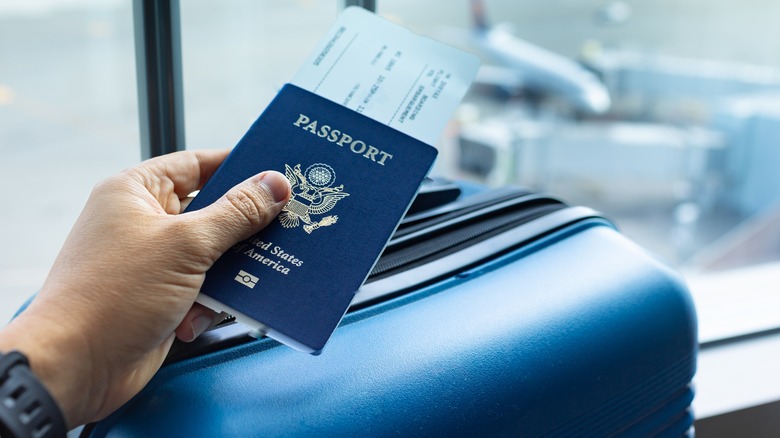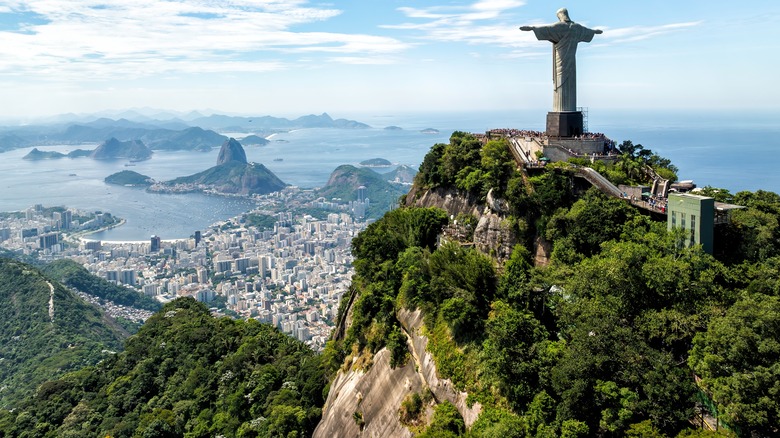Families Should Be Cautious In This South American Country Due To A New US Travel Advisory
The U.S. Department of State often issues travel advisories to warn American citizens of heightened risks or concerns in specific destinations. These go from Level 1, meaning "exercise normal precautions" to Level 4, meaning "do not travel." And even though Brazil has often been called the friendliest country in South America, it was recently bumped up to a Level 2 travel advisory. While that doesn't mean you should cancel your trip to Rio, it does mean U.S. citizens are advised to "exercise increased caution" when visiting. To put that into more context, other countries currently sitting at a Level 2 advisory include Belgium, China, Costa Rica, India, France, and Italy.
Level 1 and 2 advisories are reviewed every 12 months, so unless something changes substantially between now and early 2026, Brazil is expected to remain at a Level 2. Citing a recent ransom kidnapping of American tourists, the U.S. government explains Brazil's ranking is because of crime and kidnapping concerns. A specific case isn't mentioned, however one kidnapping made headlines in 2024 after a U.S.-based model and her family were kidnapped for 12 hours in São Paulo. Brazil had over 4,000 kidnapping cases in 2020, according to Statista.
Specifically, the advisory warns not to travel within 100 miles of Brazil's land borders, with the exception of Foz do Iguacu National Park and Pantanal National Park. It also says to avoid "informal housing developments" like favelas, as well as Brasilia's "Satellite Cities" at night, including Ceilandia, Santa Maria, Sao Sebastiao, and Paranoa. The government advises that travelers stay alert of their surroundings, don't go to bars and clubs alone, don't accept food or drinks from strangers (and keep an eye on yours at all times, as drugging is common), and be careful when using ATMs and public transportation.
More tips for safe travel to Brazil
Several of the things tourists should never do when visiting Rio de Janeiro are echoed in the U.S. travel advisory — showing off signs of wealth, exploring beaches at night, and visiting favelas. Travelers should also be aware of "date drug scams," according to the advisory. This makes sense — according to Brazilian police data, more than 90% of kidnappings in São Paulo have been initiated through dating apps like Tinder (via BBC News Brazil). But this isn't the typical "choose the bear" situation women tend to keep in mind on a regular basis — in these cases, men between the ages of 30 to 65 are the primary targets.
It's always a good idea to have a contact to touch base with regularly whenever you're traveling. That way, they'll know as soon as something is amiss. Don't blast your itinerary or personal information on social media, either. Social media can provide more than enough information to would-be kidnappers and robbers, whether it's through check-ins or simply analyzing the background of recently-posted photographs. In August 2025, four suspects were arrested for a March kidnapping of a Brazilian woman whose son worked in the crypto industry. Police said the kidnappers carefully studied their victims' social media accounts to plan the attack before demanding a ransom in cryptocurrency. So save the Insta-brags for after you return home.
Consider taking extra precautions such as purchasing travel insurance and enrolling in the Smart Traveler Enrollment Program (STEP), which can help officials contact you quickly in an emergency. For more tips, check out Samantha Brown's top hacks for staying safe while traveling. With a bit of planning, situational awareness, and common sense, you can enjoy all Brazil has to offer as safely as possible.

